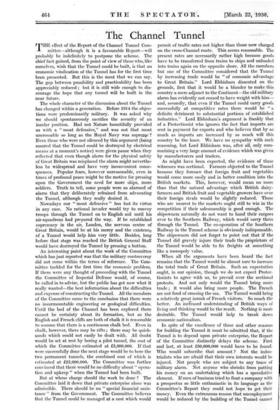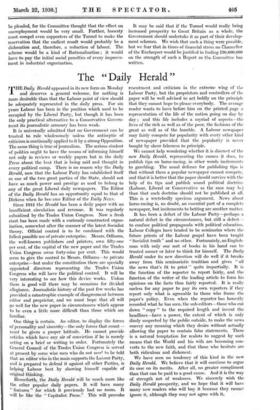The Channel Tunnel T HE effect of the Report of the
Channel Tunnel Com- mittee—although it is a favourable Report—will probably be indefinitely to postpone the scheme. The chief fact gained, from the -point of view of those who,like ourselves, wish that the Tunnel could be built, is that an economic vindication of the Tunnel has for the first time been presented. But this is the most that we can say. The gap between 'possibility and practicability has been appreciably reduced ; but it is still wide enough to dis- courage the hope that any tunnel will be built in the near future.
The whole character of the discussion about the Tunnel has changed within a generation. Before 1914 the objec- tions were predominantly military It was asked why we should spontaneously sacrifice the security of an insular position. Had not Nature bountifully provided us with a " moat defensive," and was not that moat uncrossable so long as the Royal Navy was supreme ? Even those who were not silenced by this argument (being assured that the Tunnel could be destroyed by electrical means at a moment's notice) were given pause when they reflected that even though alarm for the physical safety of Great Britain was misplaced the alarm might neverthe-: less be widespread and have very inconvenient conse- quences. Popular fears, however unreasonable, even in times of profound peace might be the motive for pressing upon the Government the need for more ships, more soldiers. Truth to tell, some people were so alarmed of alarm that they deliberately refrained from advocating the Tunnel, although they really desired it.
Nowadays our " moat defensive " has lost its virtue in any case. No rational invader would try to convey troops through the Tunnel on to English soil until his air-squadrons had prepared the way. If he established supremacy in the air, London, the nervous centre of Great Britain, would be at his mercy and the existence of a Tunnel would help him very little. Besides, long before that stage was reached the British General Staff would have destroyed the Tunnel by pressing a button.
An interesting point about the work of the Committee which has just reported was that the military controversy did not come within the terms of reference. The Com- mittee tackled for the first time the- economic problem. If there were any thought of proceeding with the Tunnel the Committee of Imperial Defence would, of course, be called in to advise, but the public has got now what it really wanted—the best information about the difficulties and expense of constructing the Tunnel. All the members of the Committee came to the conclusion that there were no insurmountable engineering or geological _difficulties. Until the bed of the Channel has been explored there cannot be certainty about its formation, but as the English and French cliffs are both of chalk it is reasonable to assume that there is a continuous chalk bed. Even in chalk, however, there may be rifts ; there may be quick- sands which could not easily be dealt with. All doubt would be set at rest by boring a pilot tunnel, the cost of which • the Committee estimated at £5,600,000. If that were successfully done the next stage would be to bore the two permanent tunnels, the combined cost of which is estimated at £25,000,000. The Committee was further convinced that there would be no difficulty about " opera- tion and `upkeep " when the Tunnel had been built.
But at whose charge should the work be done ? The Committee laid it down that private enterprise alone was admissible. There should be no " special financial assis- tance " from the Government. The Committee believes that the Tunnel could be managed at a cost which would permit of traffic rates not higher than those now charged on the cross-Channel route. This seems reasonable. The present rates are necessarily rather high because goods have to be transferred from trains to ships and unloaded into trains again on the opposite shore. All the members but one of the Committee considered that the Tunnel by increasing trade would be " of economic advantage to Great Britain." Lord Ebbisham dissented on the grounds, first that it would be a blunder to make this country a mere adjunct to the Continent—the old military alarm has evidently not ceased to have weight with him— and, secondly, that even if the Tunnel could carry goo& successfully at competitive rates there would be " a definite detriment to substantial portions of established industries." Lord Ebbisham's argument is frankly that of a Protectionist who ignores the fact that imports are sent in payment for exports and who believes that by as much as imports are increased by so much will this country be the loser. We have no sympathy with such reasoning, but Lord Ebbisham was, after all, only sum- marizing a very large amount of evidence which was given by manufacturers and traders.
As might have been expected, the evidence of these witnesses was sectional. Farmers objected to the Tunnel because they foresaw that foreign fruit and vegetables would come more easily and in better condition into the British markets. This, however, would mean no more than that the natural advantage which British dairy- farmers and British fruit and vegetable growers have over their foreign rivals would be slightly redueed. Those who are nearest to the markets ought still to win in- 'the competition if their salesmanship is good enough. The Shipowners naturally do not want to hand their cargoes over to the Southern Railway, which would Call* them through the Tunnel. The co-operation of the Southern Railway in the Tunnel scheme is obviously indiSpensible. The shipowners did not forget to point out that if the Tunnel did gravely injure their trade the priSPrietOrS of the Thnnel would be able to fix freights at • soniethitig like a monopoly value.
When all the arguments have been heard the feet remains that the Tunnel would be almost aure- to increase the total trade of Great Britain. Such an expectation ought, in our opinion, though we do not expect Protec- tionists to agree with us, to prevail over the sectional protests. And not only would the Tunnel bring more trade ; it would also bring more people. -The French are not-fond of crossing the sea. The Tunnel would bring a relatively great inrush of French visitors: - So much the better. An increased understanding' of British ways of living and thinking would be the result. Nothing is more desirable. The Tunnel would help to break down economic nationalism.
In spite of the excellence of these and Other reasons for building the Tunnel it must be admitted that, if the Tunnel is to depend upon private enterprise, -the Report of the Committee distinctly delays the scheme. ' First and last, at least £30,600,000 'would have to tIO found. Who would subscribe that amount ? Not the induS- trialists who are afraid that their own interests would be injured. ' Not people who are subject to any trice of military alarm. Not anyone who Shrinks from putting his money on an undertaking which has -a speciilatiVe element. If men of business tried to float-a company with a 'prospectus so little enthusiastic in its language as the COminittee's Report they'could hot hope to get their money. Even the extraneous reason that unemployment would -be reduced by the building of the Tunnel cannot be pleaded, for the Committee thought that the effect on unemployment would be very small. Further, honesty must compel even supporters of the Tunnel to make the reservation that the earliest result would probably be a dislocation and, therefore, a reduction of labour. The scheme would be a kind of Rationalization ; it would have to pay the initial social penalties of every improve- ment -in industrial organization. It may be said that if the Tunnel would really bring increased prosperity to Great Britain as a whole, the Government should undertake it as part of their develop- ment schemes. We wish that such a thing were possible, but we fear that in times of financial stress no Chancellor of the Exchequer would be justified in finding £30,600,000 on the strength of such a Report as the Committee has written.



















































 Previous page
Previous page